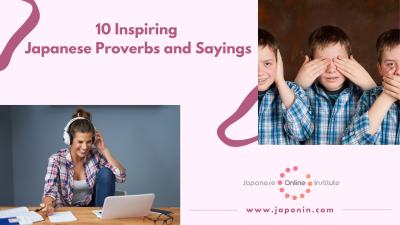Top 10 Inspiring Japanese Proverbs and Sayings
- gova
- 木, 30 12月 2021
- Japanese culture Japanese language expressions

Besides learning kanji from apps and practicing speaking Japanese, knowing inspiring Japanese proverbs is a great way to speed up your study process. Why? Because you’ll be exposed to new vocabulary — and maybe even get valuable wisdom.
Japanese proverbs paint a picture of different situations. They are a reflection of Japanese culture and hundreds of years of history. Not only are they interesting to read, but they unlock a part of Japan you wouldn’t know.
Studying proverbs helps you to learn more about different cultures. In Japanese, proverbs are known as ことわざ (kotowaza).
Here are 10 Inspiring Japanese proverbs that will inspire you to make your life better. We have included example sentences as well for you to know how to use these sayings!
Be sure to check out JOI if you are interested in learning Japanese!
Types of Japanese Proverbs
Much like anywhere else, there’s not one type of proverb in Japan. Heavy in history, culture and traditional values.
1. 自業自得 -じごうじと
Pronunciation: jigōjitoku
Translation: “One’s act, one’s profit”
Meaning: Suffering consequences (of one’s own actions) / Reap what you sow
2. 虎穴に入らずんば虎子を得ず
Pronunciation: koketsu ni irazunba koji wo ezu
Translation: “If you do not enter the tiger’s cave, you will not catch its cub.”
Meaning: You can’t do anything without risking something / Nothing ventured, nothing gained
3. 猿も木から落ちる
Pronunciation: Saru mo ki kara ochiru
Translation: “Even monkeys fall from trees”
Meaning: Even skilled experts can make a mistake / Nobody’s Perfect
4. 光陰矢の如し
Pronunciation: kōin ya no gotoshi
Translation: “Time flies like an arrow.”
Meaning: Life is short / Time and tide wait for no man
5. 覆水盆に返らず
Pronunciation: fukusui bon ni kaerazu
Translation: “Spilt water won’t go back into its tray”
Meaning: What’s done is done / It is no use crying over spilt milk
6. 明日は明日の風が吹く
Pronunciation: ashita wa ashita no kaze ga fuku
Translation: “The winds of tomorrow will blow tomorrow”
Meaning: Do not be worried about your bad situation, because things change overtime
7. 七転び八起き
Pronunciation: nana korobi ya oki
Translation: “Fall down seven times but get up eight times”
Meaning: If at first you don’t succeed, try and try again / Don’t give up
8. 清水の舞台から飛び降りる
Pronunciation: nanakiyomizuno-butaikara-tobioriru
Translation: “Take a leap from the stage of Kiyomizu”
Meaning: Make a resolution / To take the plunge
9. 雨降って地固まる
Pronunciation: ame futte ji katamaru
Translation: “After a storm comes a calm”
Meaning: Adversity strengthens the foundations / A relationship often gets closer after a quarrel.
10. 三人寄れば文殊の知恵
Pronunciation: sanninyorebamonjunochie
Translation: “When three people meet, wisdom is exchanged”
Meaning: The more people you have, the more ideas you would get through the discussion.

